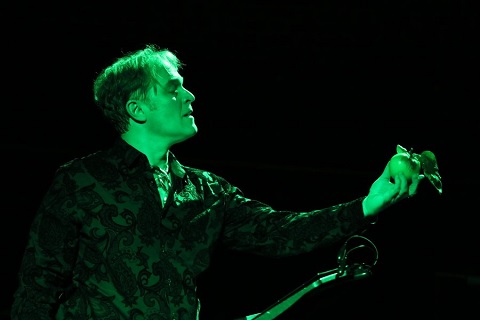Into the blackness of the unlit Cockpit Theatre resounded a spoken voice,
solemnly pronouncing Book 12 of Revelations. Piano chords stamped
angrily, followed by lighter, exploratory gestures which ventured through
that darkness. Then, we heard a sung voice which flung a question into the
void:
“Is this the region, this the soil, the clime,
… That we must change for Heaven, this mournful gloom
For that celestial light?”
The first few minutes of Geoff Page’s Paradise Lost - a one-man
show written for countertenor Lawrence Zazzo, which was performed live on
12th September, presented as an interactive broadcast three days
later, and is available on demand for one month - set out the work’s
musical stall. Lyrical ‘arias’, punctuated by melismatic swoops, swells and
slides; alternations between Zazzo’s countertenor and baritone ranges;
minimalist repetitions, pulsing moderato chords and sparse, high
tinklings from Page at the piano. More cantata than opera - though perhaps
not presented in its ‘final’ form (in a post-show discussion Zazzo
indicated that the hour of music that we experienced had been whittled out
of a much longer work) - Page’s score was decoratively pictorial rather
than dramatic, though others may well have found its cinematic,
emotion-inciting patterns more satisfying.
What made this Tête-à-Tête Opera production so stimulating was Zazzo’s
performance as Lucifer, the fallen angel, tempter of Eve, destroyer of
man’s innocence. Weaving through gentle lyricism (there are a few
Finzi-esque pastoralisms, shot through with the odd touch of modernism),
strident anger, and spoken declamation, this was a performance which
embraced an astonishing emotional gamut and did so with courage, commitment
and impressive technical underpinning. Purity, power, presence: Zazzo
evinced all three. What a show with which to return to the performing
platform after months of lockdown and the silencing of one’s singing voice.
Anyone attempting to turn Milton’s ten books and ten thousand lines-plus of
blank verse into a one-hour musico-dramatic work faces an impossible task.
Page wisely focuses on just a few passages of text: those which, in the
main, depict the thoughts and words of Lucifer himself. We have the fall
from heaven in Book 1, the temptation of Eve in Book 9, and the exultant
reflections (from Book 10) of the deluded ‘victor’, whose power Milton’s language
undermines even as his words describe. There are a few lines from the start
and end of Books 2 and 3; and imagery and phrases from Book 4, when Satan
first espies Eve, are inserted into the temptation scene. Some excisions of
imagery make a nonsense of the grammar. As Page pointed out, the story is
well known so there’s no need to explain and fill in gaps, but this didn’t
dissuade him from using a spoken voice-over narration; and we hear Eve’s
voice too. Neither of these spoken voices were identified or credited.
But, the focus on Lucifer himself is effective: and one can imagine this
score working very well as a monologue, perhaps retitled Lucifer,
in the manner of Britten’s Phaedra. The deeply felt despair of the
loss of celestial light; the vengeful conversion of defeat into victory;
the heroism which is heading unstoppably towards horrific self-destruction:
we feel all of Lucifer’s delusions and ambitions. A chair and music-stand
were strewn with ivy, an apple was ‘plucked’ from a ‘tree’, and the
tempting of Eve was vocally irresistible. We heard the crunch of the bite
that gave man ‘knowledge’ and left him in eternal suffering.
Satan’s final triumphant ecstasies omitted a crucial phrase from Milton’s
text: ‘His seed, when is not set, shall bruise my head:/ A world who would
not purchase with a bruise,/ Or much more grievous pain?/ Ye have the
account/ Of my performance: What remains, ye
gods,/ But up, and enter now into full bliss?’
For, this was a stunning performance: authoritative and brave -
and, much like Milton’s own rebellion against absolute rule, blindness and
loss, a reminder of human courage, ‘never to submit or yield/ and what is
else not to be overcome?’
Claire Seymour
Paradise Lost
: Geoff Page (composer/piano), Lawrence Zazzo (countertenor)
Tête-à-Tête 2020; performed live at the Cockpit Theatre, London, 12 th September 2020; broadcast on 15th September 2020.
